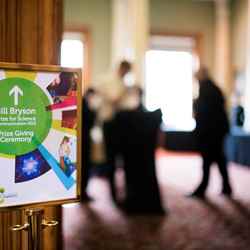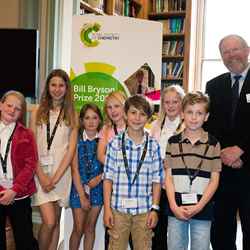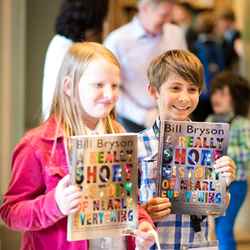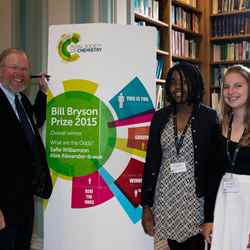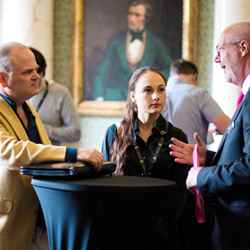The Bill Bryson Prize for Science Communication 2015
Winners and runners-up of the 2015 Bill Bryson Prize gathered at the Royal Society of Chemistry’s Burlington House, celebrating the brilliant creativity of this year’s entries.
Royal Society of Chemistry chief executive, Dr Robert Parker, welcomed students, relatives, teachers and members of the judging panel, saying: “2015 marks the tenth anniversary and the theme for this year’s competition, as all of you know, was chance.
"We received over 500 entries this time, from primary, secondary and international school students, and entries covered everything from the scientific theory to chance discoveries.
"Some popular themes were things like the big bang theory, the discovery of penicillin and insulin, Darwin’s theory of evolution, the chance of your eyes being a certain colour and even the possibility of alien life."
The Bill Bryson Prize is a creative science communication competition, open to students around the world from ages 5–18, and there are three categories: ages 5–11, 12–14 and 15–18. The theme for 2015 was 'Chance in science'. From the big bang to evolution, and probability to penicillin, all kinds of scientific concepts relate to ‘chance’. We wanted you to tell us about your favourite.
Previous entries have included videos, songs, sculptures, posters, poems, press articles, cartoons, games, magazines – even plays and podcasts. We love creativity and originality so our judges were impressed by the quality of this year’s entries, which included a home-made video game and even an app.
Best-selling author Bill Bryson presented the winners with their certificates, thanking the Royal Society of Chemistry for our “heroic” efforts in running the competition.
He said: "I do think it’s a wonderful thing that the RSC does this year after year. For a lot of us it’s a very exciting initiative and I think it’s a wonderful way of allowing kids to express themselves in imaginative and creative ways, in ways the national curriculum doesn’t always allow them to do.
"I think it’s the most fantastic thing and I think it’s particularly heroic that the RSC doesn’t insist that the entries are limited to chemistry, that it can be any of the sciences, which I think is great because it gives the entrants the maximum amount of freedom to express themselves.
"And that is why you are all here today, because you have expressed yourselves brilliantly. Every single one of you who entered and made it on to a shortlist, is a huge achievement. As you heard, there were loads and loads of entries and I think it’s safe to say that this was the highest level of quality that we’ve had in all ten years – it does seem to get better and better and the kids just get more and more imaginative and clever and entertaining and enthusiastic each year.
"It’s the variety that is so exciting about it and you realise in doing this, as I do year after year, that there are so many delightful ways of expressing an enthusiasm for and an excitement about chemistry and what it does for us – and how it answers all the questions that we have."
The Royal Society of Chemistry’s relationship with Bill Bryson began in 2005 when we sent a copy of his book, A Short History of Nearly Everything to all schools and colleges in the UK. Bill generously donated his royalties from the sales to establish a schools science communication award and his cash donation was matched by both the Royal Society of Chemistry and his publishers, Transworld.
Bill Bryson’s next book, The Road to Little Dribbling: More Notes From a Small Island, will be released in October, with Bill once more plotting a circuitous and hilarious path up and down the country.
His bestselling travel books include The Lost Continent, Neither Here Nor There and the original Notes from a Small Island. His acclaimed book on the history of science, A Short History of Nearly Everything, won the Royal Society’s Aventis Prize as well as the Descartes Prize, the European Union’s highest literary award.

